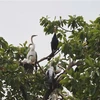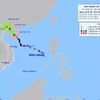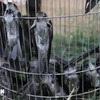The latest report by the wildlife trade monitoring network TRAFFIC has claimed the record-high rhino poaching in South Africa is being fed by a surging demand from Vietnam, identifying the country as the main market for rhino horn.
However, Vietnamese authorities and conservation experts have denied the allegation, saying the study, which has attracted much coverage by foreign press, is not objective and evidence-based. They say that rhino horn is not used in Vietnam but rather it arrives in transit to a third country.
TRAFFIC is a strategic alliance of International Union for Conservation of Nature and World Wide Fund for Nature.
According to the 176-page study, entitled The South Africa-Vietnam Rhino Horn Trade Nexus: A deadly combination of institutional lapses, corrupt wildlife industry professionals and Asian syndicates, the demand for horn in Vietnam, which had just emerged recently, will continue to rise and that serrated rhino horn is widely available for sale in Vietnam .
The study identifies the main user groups in Vietnam as affluent party-goers who rely on rhino horn as a "hangover cure" and terminally ill patients who falsely believe that rhino horn can cure cancer.
The report claims that the surging demand from these new buyers has helped trigger a dramatic escalation in poaching of live animals in South Africa, home to the biggest rhino population in the world. The number of rhino being poached increased from 13 in 2009, 83 in 2008, 122 in 2009 to all-time high of 448 last year.
The TRAFFIC team takes note that poachers made use of the loopholes in "pseudo hunting" where the Vietnamese participants are observed to be interested not in the hunt itself but only in the horn. Of 43 arrests of Asian nationals for rhino crimes in South Africa, 24 have been Vietnamese, accounting for 56 percent.
Speaking to the Vietnam News on Aug. 24, Do Quang Tung, deputy director of Vietnam CITES Management Authority, said that as a country with a tradition of using wild animals and plants for medicines, the illegal transport, trade and consumption of rhino horn is still happening on the ground yet "Vietnam could not be the main market for South African rhino horn, not even close".
Tung argued that had the TRAFFIC's assessment about Vietnam as the main market for horn been correct, and given that one rhino possesses two horns totally weighed 10kg and South Africa lost about 450 rhinos last year, it will mean that Vietnamese had used about 4.5 tonnes of rhino horn, which is worth about 250 million USD on the market.
"This is impossible because Vietnamese could not spend this huge amount of money given the annual average income per capita last year is just 1,300 USD. In addition, there could be no criminal network which is capable of moving such a large amount of an illegal commodity via multiple countries like this," he said. Currently, there is no direct flight between Vietnam and South Africa .
According to the Vietnamese Embassy in South Africa, there are only 40 Vietnamese living there, which Tung said is not sufficient to establish an illegal hunting and/or trade network.
Tung questioned the credibility of the report, whose assessment he said is based only on information from non-governmental organisations and mass media without consulting any law enforcement agency.
"There is no comprehensive study on the consumption of rhino horns in Vietnam . Of course, if you go to the National Cancer Hospital and ask any patient there if they want to use rhino horn, they will answer ‘yes' without hesitation because recently there has been a widely circulated rumour that rhino horn can cure cancer. But that does not necessarily mean they have rhino horn at their disposal," he said.
Professor Dang Huy Huynh, chairman of the Vietnam Zoological Society, said that despite the wide use of wild animals in Vietnamese traditional medicine, rhino horn has never been a popular ingredient and is rarely used. Even if there is such an emerging group of affluent users who could splurge on rhino horn in Vietnam, it will be too small to make the country a major consumer for the pricey commodity.
Both Tung and Huynh said that rhino horn is only in transit in Vietnam before moving on to another country.
While the report has called for Vietnam to do more, Tung, whose agency monitors Vietnam's compliance with the Convention on International Trade in Endangered Species of Wild Fauna and Flora (CITES), said Vietnam has continuously improved its legal framework and implemented many measures to address the illegal trade of rhino horns and has a good record in catching the couriers responsible.
"Vietnam has made the highest number of arrests relating to rhino horn transport and trade in the world," he said.
Professor Huynh said that as a transit country, Vietnam's current geographical position, sharing a long border with different countries, presents a big challenge for law enforcers to monitor the wildlife trade.-VNA
However, Vietnamese authorities and conservation experts have denied the allegation, saying the study, which has attracted much coverage by foreign press, is not objective and evidence-based. They say that rhino horn is not used in Vietnam but rather it arrives in transit to a third country.
TRAFFIC is a strategic alliance of International Union for Conservation of Nature and World Wide Fund for Nature.
According to the 176-page study, entitled The South Africa-Vietnam Rhino Horn Trade Nexus: A deadly combination of institutional lapses, corrupt wildlife industry professionals and Asian syndicates, the demand for horn in Vietnam, which had just emerged recently, will continue to rise and that serrated rhino horn is widely available for sale in Vietnam .
The study identifies the main user groups in Vietnam as affluent party-goers who rely on rhino horn as a "hangover cure" and terminally ill patients who falsely believe that rhino horn can cure cancer.
The report claims that the surging demand from these new buyers has helped trigger a dramatic escalation in poaching of live animals in South Africa, home to the biggest rhino population in the world. The number of rhino being poached increased from 13 in 2009, 83 in 2008, 122 in 2009 to all-time high of 448 last year.
The TRAFFIC team takes note that poachers made use of the loopholes in "pseudo hunting" where the Vietnamese participants are observed to be interested not in the hunt itself but only in the horn. Of 43 arrests of Asian nationals for rhino crimes in South Africa, 24 have been Vietnamese, accounting for 56 percent.
Speaking to the Vietnam News on Aug. 24, Do Quang Tung, deputy director of Vietnam CITES Management Authority, said that as a country with a tradition of using wild animals and plants for medicines, the illegal transport, trade and consumption of rhino horn is still happening on the ground yet "Vietnam could not be the main market for South African rhino horn, not even close".
Tung argued that had the TRAFFIC's assessment about Vietnam as the main market for horn been correct, and given that one rhino possesses two horns totally weighed 10kg and South Africa lost about 450 rhinos last year, it will mean that Vietnamese had used about 4.5 tonnes of rhino horn, which is worth about 250 million USD on the market.
"This is impossible because Vietnamese could not spend this huge amount of money given the annual average income per capita last year is just 1,300 USD. In addition, there could be no criminal network which is capable of moving such a large amount of an illegal commodity via multiple countries like this," he said. Currently, there is no direct flight between Vietnam and South Africa .
According to the Vietnamese Embassy in South Africa, there are only 40 Vietnamese living there, which Tung said is not sufficient to establish an illegal hunting and/or trade network.
Tung questioned the credibility of the report, whose assessment he said is based only on information from non-governmental organisations and mass media without consulting any law enforcement agency.
"There is no comprehensive study on the consumption of rhino horns in Vietnam . Of course, if you go to the National Cancer Hospital and ask any patient there if they want to use rhino horn, they will answer ‘yes' without hesitation because recently there has been a widely circulated rumour that rhino horn can cure cancer. But that does not necessarily mean they have rhino horn at their disposal," he said.
Professor Dang Huy Huynh, chairman of the Vietnam Zoological Society, said that despite the wide use of wild animals in Vietnamese traditional medicine, rhino horn has never been a popular ingredient and is rarely used. Even if there is such an emerging group of affluent users who could splurge on rhino horn in Vietnam, it will be too small to make the country a major consumer for the pricey commodity.
Both Tung and Huynh said that rhino horn is only in transit in Vietnam before moving on to another country.
While the report has called for Vietnam to do more, Tung, whose agency monitors Vietnam's compliance with the Convention on International Trade in Endangered Species of Wild Fauna and Flora (CITES), said Vietnam has continuously improved its legal framework and implemented many measures to address the illegal trade of rhino horns and has a good record in catching the couriers responsible.
"Vietnam has made the highest number of arrests relating to rhino horn transport and trade in the world," he said.
Professor Huynh said that as a transit country, Vietnam's current geographical position, sharing a long border with different countries, presents a big challenge for law enforcers to monitor the wildlife trade.-VNA



















